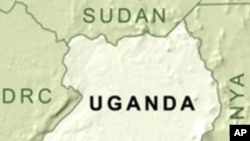A coalition of 17 local and international human rights groups have joined together to fight wide-ranging anti-homosexual legislation introduced this week in Uganda’s parliament. The coalition says restrictions move beyond bedroom conduct to challenge basic freedoms of expression and assembly and place barriers against the promotion of HIV/AIDS prevention projects.
Executive director Cary Alan Johnson of the International Gay and Lesbian Human Rights Commission (IGLHRC) says the law’s discriminative and harsh punitive features represent a last-ditch effort by anti-gay and evangelical groups to restrict personal freedoms in Uganda and in other African countries, and he hopes the rights groups can prevent the bill’s passage.
“Over the course of the last year, there’s been an increasing pattern of homophobic discourse at play in Uganda, including a conference that occurred several months ago, in which a number of US evangelical leaders came to Uganda to promote reparative therapy and other types of human rights violations against Ugandan LGBT people…and our feeling is that the bill is targeting not just LGBT people, but freedom of expression and a broad level of political discourse in general,” he noted.
Under existing laws, Uganda police may arbitrarily arrest citizens suspected of having consensual sex with partners of the same gender. But a new provision that would forbid organizers from promoting homosexuality places curbs on publishing information and providing funds and meeting facilities for activities. The draft bill also advocates imposing the death penalty in cases it considers to be “aggravated homosexuality.” Rights commission executive director Johnson says the harsh penalties are a throwback to colonial times when controlling powers used such restrictions to stifle Africans’ personal freedoms.
“The trend in much of the world is toward decriminalizing homosexuality and understanding that there is a broad variety of sexual expressions among us as human beings and that homosexuality and bisexuality is one of them. Most of the countries in Africa that still criminalize same-sex acts inherited these laws from colonial masters, particularly from British colonial rule, and that shows us in fact that the homophobia that’s existing in many countries is really a remnant of our colonial history,” he observed.
77 countries around the world still have stiff same-sex penalties, including Burundi, which criminalized homosexuality this past April. Lesbian, gay, bisexual and transgender rights groups (LGBT’s) are increasingly combining their efforts with international rights defenders to oppose earlier restrictions and promote HIV/AIDS awareness initiatives for gay Africans, according to Johnson. He says a lot more work needs to be done, for example in Uganda’s and Burundi’s neighbor, Rwanda, to fight off new legislation that still has not been approved.
“More than two-thirds of the countries in Africa still have provisions that criminalize consensual same sex acts. Rwanda, the law there is under discussion, but it has not yet passed, and we certainly hope that a broad coalition of rights organizations in Rwanda will prevent that law from being passed,” he noted.
As Senior Africa Specialist for the IGLHRC, Cary Alan Johnson, who was based in Cape Town, South Africa, led efforts to bring LGBT Africans to two sessions of an International Conference on AIDS and STDs in Africa, in Abjua, Nigeria in December 2005, and in Dakar, Senegal last year.
In 2006, Nigeria’s National Assembly introduced a stiff anti-homosexual proposal known as Same-Sex Marriage Prohibition Act. Johnson says the measure, which tried to impose five year jail sentences on those who aid and abet the performance of same-sex marriages, was also aimed at shutting down discussion and debate about rights for gay Nigerians. The law has yet to be passed after receiving strong criticism from LGBT groups during the 2007 general elections.
In 12 Nigerian states that subscribe to Sharia law, homosexuality is punishable by death. In the other states, jail sentences of up to 14 years may be imposed under local laws. Nigeria’s National Assembly is still considering national legislation to criminalize same-sex marriages across the country.






